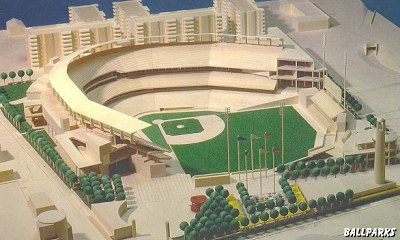
By Jeff Blair
Montreal -- The man who has been hired by the Montreal Expos' dissident limited partnership for his marketing know-how is biding his time right now. The work of saving the franchise is going on in corporate boardrooms in the heart of Montreal, where yesterday club officials and the son of potential majority partner Jeffrey H. Loria concluded two days of examining the Expos' finances and business plan.
"In French, we have a word that describes what's happened here, désaffection, a sense that 'We've had enough of this baloney,' " said Roger Samson, the former vice-president of the Sico paint company, who has been hired as a special adviser and will oversee the sale of personal seat licences in any relaunched initiative for a new ballpark. "The atmosphere is simply not conducive [for marketing]. There are clouds over the franchise right now, and I believe the minute they're removed the time will be right."
No one will say publicly how much those clouds have thinned in recent weeks. But club chairman Jacques Ménard, who is at the head of the Expos' limited partners trying to buy out president Claude Brochu and build a scaled-down outdoor ballpark, has met in recent weeks with Loria or with representatives of the New York-based art dealer and former minor-league baseball club owner, who is said to be ready to commit $75-million (Canadian) to become majority partner.
Loria's son David, a financial analyst, was part of a group that met with Expos officials, including vice-president Laurier Carpentier. Ménard said after the meeting that he wants to present a concrete proposal to major-league baseball, in conjunction with Loria, before The All-Star Game break, July 12 to 14.
Ménard described recent meetings as "the normal evolution of events in connection with a very complex project." Part of that evolution includes the analysis of a new business plan for the club being conducted by the Minneapolis-based head of Arthur Andersen & Co.'s national sports industry division, Robert Starkey. Baseball has also retained Earl Santee, senior vice-president of HOK Sports of Kansas City, a company on the cutting edge of ballpark design, to examine three $175-million proposals for a downtown ballpark that would have fewer bells and whistles than the $250-million complex that Brochu failed to get built.
Baseball people say the involvement of Starkey and Santee indicates the urgency baseball has attached to the Expos' situation. Starkey has had input in everything from labour proposals to successful ballpark initiatives in Milwaukee and, most recently, Cincinnati, where he helped convince Hamilton County officials that the Reds should contribute $30-million (U.S.), instead of $80-million, toward construction of a $297-million ballpark. Santee, an often-quoted source on ballpark issues, declined a request for an interview through a spokesman. Starkey would only say he was still gathering information and that he didn't know yet whether he would attend a meeting of major-league owners in Pittsburgh on June 9 and 10 at which the status of the Expos is expected to be discussed.
Under terms of baseball's collective labour agreement, a draft of the 2000 regular-season schedule must be sent to the Major League Baseball Players' Association by July 1. For that reason, baseball wanted something definite from Ménard's group by the end of May, even though the players' association has the right to review the schedule up to Oct. 15. But the Expos' dissident limited partners have so far stood strong against Brochu, and the threat of legal action against baseball has been implied, if not stated.
Brochu reiterated at an Expos game last week that he needs to be satisfied that any new majority owner would be willing to agree to a 20-year lease at any new ballpark.
The Expos will open a six-game homestand tomorrow night. The team is a woeful 7-18 at Olympic Stadium, amid the bleakest atmosphere in Felipe Alou's seven-year stint as manager. The Expos are a decent offensive club, but their earned-run average is at a historical high, just as home attendance flirts with a historical low. The Expos have drawn only 236,773 fans and are on pace to have the fewest spectators since the 1985 Cleveland Indians drew 655,181 to dreary Municipal Stadium.
An operating loss of between $15-million and $20-million is not out of the question, and an ability to handle financial blows until a new ballpark is built is one of the things of which Starkey and the other major-league owners need to be convinced. The unusually low cost of the three ballpark proposals has also generated skepticism.
Previous article
Next article
Head back to Save the Expos Home Page
